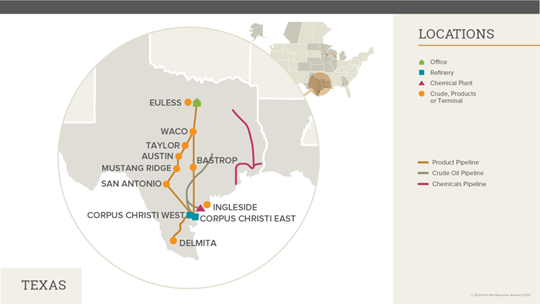Frequently Asked Questions
about the pipeline
FAQs
A pipeline will enable the airport to meet current demand and projected growth into the future. The pipeline will eliminate the need for daily fuel tanker trucks and provide a safer and more reliable method of delivering the airport the fuel it needs every day.
Pipeline FAQs
Flint Hills Resources FAQs
The BATX Pipeline is expected to be used as a common carrier system to transport Jet-A fuel from the Flint Hills Resources Bastrop Terminal in Bastrop, TX to the Austin airport.
The route for the proposed 10 inch diameter pipeline has yet to be finalized, but it is expected to originate at the Flint Hills Resources Bastrop Terminal, approximately 20 miles from the airport. The company plans to use existing public right of way along Highway 71 for much of the project.
The 10-inch pipeline will be dedicated to transporting Jet-A fuel. The pipeline would be capable of transporting alternative fuels, such as sustainable aviation fuel.
Jet fuel is a type of aviation fuel designed for aircraft powered by gas-turbine engines. It is clear to straw-colored in appearance. The most commonly used fuels for commercial aviation are Jet-A and Jet A-1, which are produced to a standardized international specification. Jet fuel is similar to kerosene and has a much higher temperature flashpoint than gasoline. This is an important safety feature, in that the risk of fire in general use, and especially following an accident, is much lower for turbo-jet aircraft. [source]
Watch: What’s the difference between jet fuel and autofuel?
Austin has seen an increase in residents, businesses, visitors, associated transit, and record-breaking air travel for more than two decades. According to Austin Bergstrom International Airport officials, the airport is currently designed to accommodate approximately 15 million annual passengers. Last year the airport served more than 21 million passengers. The city of Austin’s master plan previously projected the airport would reach 30 million annual passengers by 2037; however, it is now projected to reach that by 2027.
The Austin airport is the largest airport in the nation that relies on daily truck shipments for its fuel. Currently, it takes more than 100 tanker trucks each day to travel to Austin to supply the over 20 million gallons of jet fuel it uses each month, and airport demand is rapidly growing. Reliability issues with tanker truck deliveries contribute to operational challenges at the airport and can impact flights.
Infrastructure projects like the jet fuel pipeline will help Austin meet Jet-A fuel demand, reduce congestion for the public, and improve reliable travel, both now and in the future.
Jet fuel is currently transported by more than 100 8,000 gallon tanker trucks a day from the Flint Hills Resources fuel terminal in Bastrop, TX to the Austin airport.
A report from the National Renewable Energy Laboratory (NREL) on U.S. airport infrastructure states, “Truck deliveries help but are not ideal as it requires deliveries to be handled by the airside service contractor along with security procedures for both the fuel truck driver and entry into the secure area of the tank farm. Trucking fuel costs more than delivery by pipeline and it takes at least 20 minutes to offload a typical truck capacity of 7,500 gallons, which is not a substantial amount of fuel considering the capacity of a Boeing 737 is 6,875 gallons (Baciu 2010).”
Truck and traffic congestion can affect surrounding business and neighborhoods. The likely route for trucks to access the new fuel facility at the airport will require a left-hand turn across traffic on Highway 183 at Metropolis Drive. This pipeline will reduce the need for this surface road transportation, helping to reduce congestion in the surrounding Austin area.
The Austin Airport is expected to get busier every year and demand for jet fuel will also continue to increase, leading to more fuel trucks on the roads. The current just-in-time, truck-dependent system has been prone to reliability issues, which affect airport operations.
This can cause airlines to require additional onboard fuel when serving the Austin market and impact passenger service. Since 2019, there have been numerous fuel shortage alerts at the airport impacting operations. Construction of a direct pipeline will enable the Austin airport to meet current demand and projected growth.
Yes. Flint Hills Resources focuses on stewardship, safety and environmental compliance, ensuring the people and the community the company serves are top priorities. It does this by choosing the least disruptive route for operations and engaging community stakeholders to get the job done right.
Once permitted, the construction is expected to take approximately six months. Permitting authorities include Travis and Bastrop Counties, the Federal Aviation Administration, the City of Austin, the Railroad Commission of Texas, and the Texas Department of Transportation.
We will hold public engagement meetings in communities where the project resides, publish a project website with English and Spanish translations with detailed information, and provide information to the community in other traditional formats. Once in operation, those living near the pipeline will receive occasional pipeline safety information from Flint Hills Resources.
Visit this website for project updates. You may also contact Flint Hills Resources at 1-855-831-6353 or www.fhr.com.
The pipeline will be funded by Flint Hills Resources.
According to the U.S. Department of Transportation, pipelines are the most commonly used and safest method for transporting energy resources. Although pipelines exist in all fifty states, most of us are unaware that this vast network even exists. This is due to the strong safety record of pipelines and the fact that most of them are located underground. Installing pipelines underground protects them from damage and helps protect our communities as well. [Source]
Since 1990, statistics from the Bureau of Transportation Statistics show pipelines make up the minority of U.S. transportation accidents with less than 0.01% of all U.S. transportation accidents in 2019.
Learn more about pipeline safety in Texas from the Texas Railroad Commission and regulatory oversight from the U.S. Department of Transportation.
Flint Hills Resources monitors pipelines 24 hours a day, seven days a week at our pipeline control center and through regularly scheduled aerial and walking patrols. We also perform in-line inspections on a regular basis to ensure the safety and reliability of the system.
Pipeline operations generate negligible emissions. The project will also eliminate emissions associated with daily fuel deliveries by truck.
The proposed pipeline will be fully owned by Flint Hills Resources affiliate BATX Pipeline, LLC and operated as a common carrier system by Flint Hills Resources. We will work in close coordination with our partners at the Austin Airport and its’ airlines to ensure safety, environmental, and regulatory standards are met and exceeded. The airlines will ship the jet fuel to the airport.
Permitting authorities include Travis and Bastrop Counties, the Federal Aviation Administration, City of Austin, the Railroad Commission of Texas, and the Texas Department of Transportation. We are working closely with the necessary governmental agencies to ensure the project is in compliance with permitting and regulatory standards.
Once permitted, the construction of the pipeline is expected to take six months.
Presently, 18-wheeler fuel tanker trucks must complete a 40-mile round trip journey from Flint Hills Resources’ terminal in Bastrop to supply the airport with jet fuel. Supporting current flight operations requires approximately 100 truck loads of fuel per day. Based on the airport’s growth projections, without a dedicated pipeline, fuel truck deliveries will need to nearly double to keep up with demand in the coming years.
Flint Hills Resources is a leading refining and pipeline company with operations built on more than six decades of experience. Flint Hills Resources, the operator of the proposed pipeline to the Austin airport, has reliably served as the primary supplier of Austin’s gasoline and diesel fuel and the airport’s jet fuel for decades and has a history of being a safe and responsible operator.
Flint Hills’ refineries produce the fuels people in Austin and the Central Texas region depend on every day, with fuel derived primarily from Eagle Ford crude oil. Our focus on stewardship ensures safety, environmental compliance, and the people the company serves are always top priorities. We do this by choosing the least disruptive route for operations, engaging community stakeholders, and investing the necessary resources to get the job done right.
For decades, Flint Hills has served as the primary supplier of transportation fuel for central Texas, including the Austin area. The company also supplies most of the Jet-A fuel used at AUS and DFW Airports. We have been operating in the Lone Star State since 1981.

For more information and additional resources, contact Flint Hills Resources using the following information: General questions: 1-855-831-6353 or www.fhr.com.


